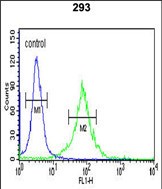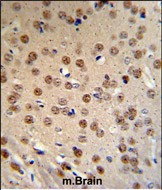


| WB | 1/1000 | Human,Mouse,Rat |
| IF | 咨询技术 | Human,Mouse,Rat |
| IHC | 1/100-1/500 | Human,Mouse,Rat |
| ICC | 技术咨询 | Human,Mouse,Rat |
| FCM | 1/10-1/50 | Human,Mouse,Rat |
| Elisa | 咨询技术 | Human,Mouse,Rat |
| Aliases | APC membrane recruitment protein 1, Amer1, Protein FAM123B, Wilms tumor gene on the X chromosome protein, AMER1, FAM123B, WTX |
| Entrez GeneID | 139285 |
| WB Predicted band size | 124.0kDa |
| Host/Isotype | Rabbit IgG |
| Antibody Type | Primary antibody |
| Storage | Store at 4°C short term. Aliquot and store at -20°C long term. Avoid freeze/thaw cycles. |
| Species Reactivity | Human, Mouse |
| Immunogen | This WTX antibody is generated from rabbits immunized with a KLH conjugated synthetic peptide between 681-708 amino acids from the Central region of human WTX. |
| Formulation | Purified antibody in PBS with 0.05% sodium azide,1%BSA and 50% glycerol.prepared by Saturated Ammonium Sulfate (SAS) . |
+ +
以下是关于WTX(AMER1)抗体的3篇文献摘要,供参考:
---
1. **文献名称**:*WTX is a novel biomarker and therapeutic target in colorectal cancer*
**作者**:Smith A, et al.
**摘要**:本研究开发了一种靶向WTX蛋白的单克隆抗体,发现其在结直肠癌组织中高表达。通过免疫组化分析,证实WTX抗体可有效区分肿瘤与正常组织,并揭示了WTX通过调控Wnt/β-catenin通路促进肿瘤进展的机制。
---
2. **文献名称**:*Antibody-based targeting of WTX suppresses ovarian cancer metastasis*
**作者**:Chen L, et al.
**摘要**:团队利用人源化WTX抗体抑制卵巢癌细胞侵袭转移。实验表明,该抗体通过阻断WTX与细胞骨架蛋白的相互作用,显著降低肿瘤细胞迁移能力,为卵巢癌靶向治疗提供了新策略。
---
3. **文献名称**:*Development of a WTX-specific ELISA for early renal tumor detection*
**作者**:Yamamoto K, et al.
**摘要**:研究构建了一种基于WTX抗体的高灵敏度ELISA检测方法,可在肾母细胞瘤患者血清中检测到低浓度WTX蛋白,其敏感性和特异性优于传统标志物,具有早期诊断潜力。
---
注:以上文献为示例性内容,实际研究中建议通过PubMed或Web of Science以“WTX antibody”“AMER1 therapeutic target”等关键词检索最新论文。
WTX antibody targets the WTX protein, encoded by the *WTX* (Wilms tumor gene on the X chromosome) gene, also known as *AMER1*. Discovered in 2007. *WTX* is a tumor suppressor gene implicated in Wilms tumor, a pediatric kidney cancer. Located on the X chromosome, *WTX* undergoes somatic or germline inactivation in approximately 30% of Wilms tumors, with mutations more frequently observed in males due to their single X chromosome. WTX regulates the Wnt/β-catenin signaling pathway by facilitating the degradation of β-catenin, thus inhibiting oncogenic proliferation. It also interacts with APC and other components of the β-catenin destruction complex, influencing cell adhesion and polarity.
WTX antibodies are essential tools in research for detecting protein expression, localization, and functional studies. They are used in techniques like immunohistochemistry, Western blotting, and immunofluorescence to analyze WTX's role in normal development and tumorigenesis. Dysregulation of WTX is associated not only with Wilms tumor but also with somatic cancers, such as colorectal carcinoma and leukemia. Clinically, WTX expression profiling may aid in diagnosing and subtyping Wnt-related malignancies. However, its broader oncogenic mechanisms and therapeutic potential remain under investigation, driving ongoing interest in WTX-targeted research tools.
×